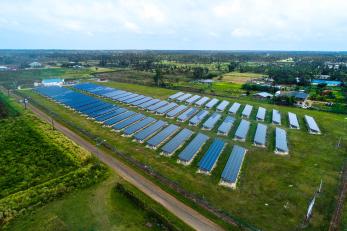Building mini-grid markets to improve living standards in off-grid Rwanda

Almost four in ten people in Rwanda currently live in poverty. The government has ambitions to lift Rwanda from a developing country to a middle-income nation, and a key to unlocking this prosperity is access to affordable electricity for all by 2024.
Rwanda has abundant natural energy resources including hydro, solar, and methane gas and yet less than a third of people have access to electricity. In rural areas this is only 12%. To reach 100%, and bring power to remote regions far from the main grid, the government estimates that almost half of electricity needs to be delivered through off-grid solutions such as standalone solar systems and mini-grids (solar, hydro or hybrid).
A growing market for standalone solar systems and micro-grids is developing in Rwanda but scaling up mini-grids has been challenging, with private sector companies struggling to develop viable business models.
In its 2016 rural electrification strategy, the Rwandan Ministry of infrastructure recognised that while mini-grids require high capital costs, they are cheaper than connecting customers to the national network in isolated, hard to reach areas, provided that there is sufficient demand to justify the investment. Therefore the government is committed to working with private sector companies to help them mitigate their risk and develop the market.
Key to the sustainability of mini-grids’ business model is to increase demand of electricity from high consumption users – businesses and industries in rural areas that are capable of paying the connection costs.
Developers of small mini-grids are more likely to recover their costs and remain profitable if they can drive up demand by attracting and powering small industries and businesses, as well as households, where consumption tends to be low. Helping these businesses to build the skills to capitalise on the electricity use can stimulate growth and diversification, improving rural prosperity.
Robert Mutalindwa, Energy 4 Impact
The Rwandan government has identified a number of areas with generation sources such as hydro, and the potential demand to make mini-grids a viable option. Energy 4 Impact’s programme, Scaling up Off Grid Energy in Rwanda – SOGER (funded by Sida, The Swedish International Development Cooperation Agency), supports the government’s rural electrification goals by working with private developers, constructing mini-grids in these areas, and local businesses to stimulate demand for electricity through increased economic activity.
One of these developers, Absolute Energy, has built a 50 kW hybrid photovoltaic plant and a 30 kW diesel backup generator in Rutenderi village, in eastern province of Rwanda Gatsibo district, which is co-financed by Endev*. The plant will provide reliable, affordable and clean electricity to about 448 Households and 57 local businesses, with the potential to improve local incomes and living conditions, boost agricultural development, trigger new businesses and services and reduce CO2 emissions.
Energy 4 impact helped Absolute Energy conduct a detailed demand assessment to determine the feasibility of their project and identify the potential businesses to attract to stimulate demand. Using this data enabled them to recruit six enterprises from the milling, welding tailoring and refrigeration sectors.
"We are linking these enterprises to reputable suppliers of electric appliances and assisting them with access to finance to purchase the equipment, aided by a grant from SOGER that finances 70% of the total cost of the appliance. Our business mentors are helping them build stronger businesses by coaching them in skills such as record keeping, marketing, pricing and customer care, and sharing technical know-how on operating the appliances safely and efficiently," explains Robert Mutalindwa.
Singirankabo Joseph runs a milling business currently powered by a costly diesel generator. “With the arrival of the mini-grid, I expect my business to grow in size and profitability”, says Joseph. “Thanks to advice from Energy 4 Impact on what machinery to buy, and where to go for finance, I plan to buy a new grinding machine which will drive down my costs and speed up processing.”
*Energising Development (EnDev) is an energy access partnership currently financed by six donor countries: the Netherlands, Germany, Norway, United Kingdom, Switzerland and Sweden. EnDev promotes sustainable access to modern energy services that meet the needs of the poor.